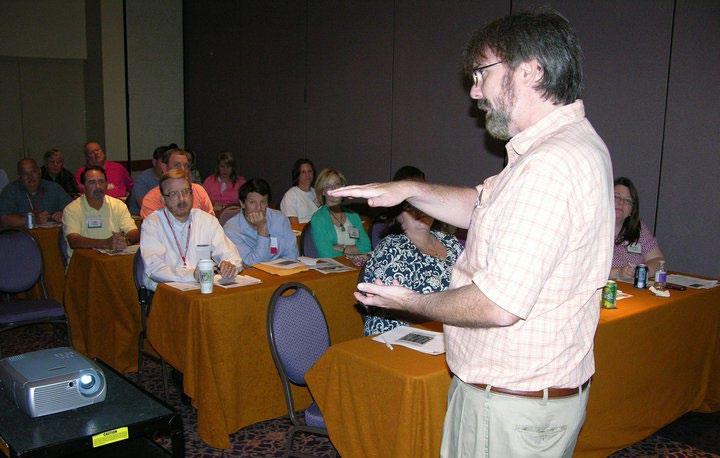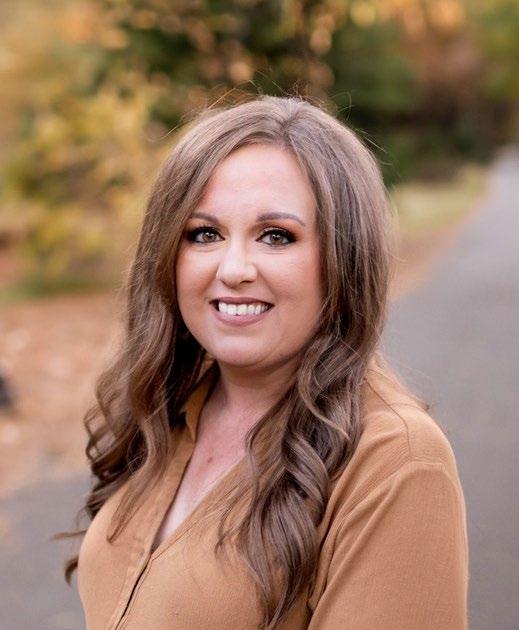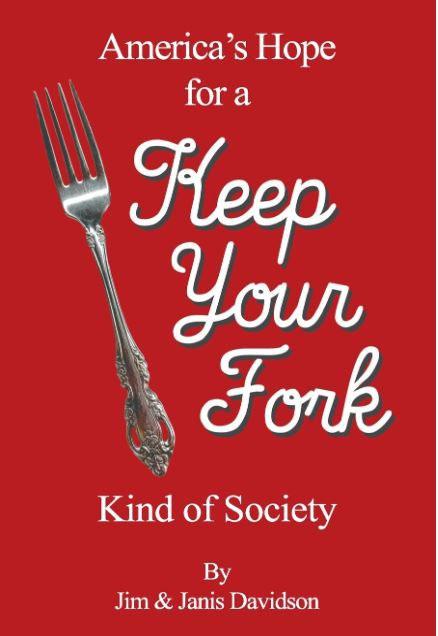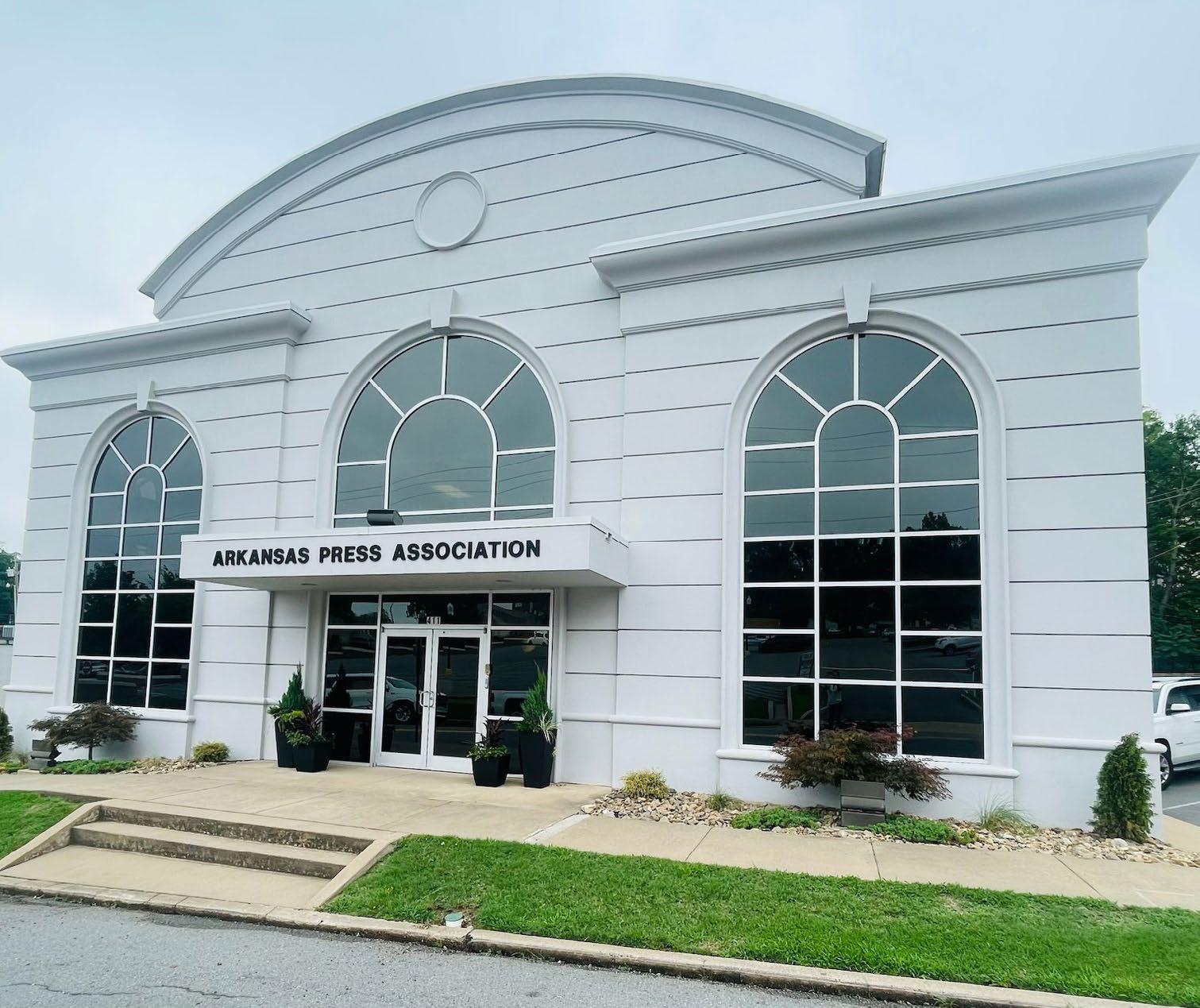Don’t forget to reserve your room in Jonesboro for 2024 APA Convention
Guest Column:
Impress upon readers the underlying value of public records
By Jim Pumarlo

Don’t forget to reserve your room in Jonesboro for 2024 APA Convention
Impress upon readers the underlying value of public records
By Jim Pumarlo
Don’t tell Kevin Slimp that newspapers are dying.
One of the nation’s foremost experts on the newspaper industry, Slimp will be a featured speaker at the 2024 Arkansas Press Association Convention and Trade Show, June 27-29 at the Embassy Suites by Hilton Jonesboro Red Wolf Convention Center.
His positive perspective on the future of newspapers in the face of dire predictions goes back some 15 years or more. At that time, he was considering a position at a well-known state university when a department head said he tended to agree with the head of the Associated Press that printed newspapers would not exist by 2018.
“He asked me what I thought of that, and I told him that is the dumbest thing I’ve ever heard,” Slimp said. “I went on to tell him if that happens, I’ll start a newspaper and make a fortune.”
“It was kind of like the Y2K phenomenon a bit earlier when we were being told the world was going to end,” Slimp said. “In the case of the projected end of printed newspapers, if you tell people that long enough, readers will start to believe it.”

That conversation led Slimp to conclude it wasn’t the position for him.
Slimp recalls a similar occurrence roughly a year before at a newspaper conference in Portland, Oregon, where the prevailing conclusion was that “print is dead.”
He said some journalism schools, and many newspapers, continue to predict the demise of the printed product. “This has been going on for some time now and we are paying the price for it,” he said.
Slimp does acknowledge negative pressures faced by newspapers, “especially in towns that are not doing well economically. There’s sometimes not a lot you can do about that.”
Another negative factor, he points out, is the takeover of solid newspaper operations over the years by venture capitalist firms. Many of these companies have limited connection to the local economy or readers and have reduced staff dramatically, resulting in poor products with limited circulation or advertising support. Such firms also are not inclined to participate in training opportunities for their employees.
Despite those concerns, Slimp remains optimistic about the future

Continued from page 1
of community newspapers in America for a simple reason – he sees a lot of good ones in his extensive travels across the country. And travel he has indeed done. Slimp has conducted more than 2,000 newspaper seminars, in every state except Alaska and Hawaii and every Canadian province except Prince Edward Island. A popular speaker, he has presented at APA meetings four or five times over his career.
Slimp lists several correlating factors that lead to a great newspaper in today’s environment:
• Local ownership (or at least locally managed).
• Long-term staff members — not a lot of turnover.
• Emphasis on quality, in terms of content and design.
• Continued training for staff.
Slimp cites newspapers such as the Standard Banner in Jefferson City, Tennessee, near his home in Knoxville, as an example of a publication that is thriving. Owned by the Gentry family since 1956, the newspaper continues to show revenue gains each year.
The Standard Banner has virtually no employee turnover, with many of the staff having worked there for 30 years or more. The commitment is to quality in both content and design.
“How do we build up our newspaper so that everyone wants to read it?” is the question Slimp knows the Jefferson City newspaper and other similar successful publications ask.
to develop special products such as a senior-oriented magazine to attract nearby regional health advertisers, including hospitals and medical professionals. Another successful example is a special publication honoring local pastors in the area. “If you get one church to participate, you get them all,” he said.
In addition to the seminars which “Newspaper Guru” Slimp conducts across the country, he provides training through his Newspaper Academy, an online opportunity for learning and improving skills in such platforms as Adobe Photoshop and InDesign, as well as quality layout suggestions and revenue ideas.
The online training volume really accelerated during COVID-19, a period when he, of necessity, greatly reduced seminar presentations.
While much of his earlier training categories dealt with technical issues, Slimp has been focused additionally in recent years on newspaper design and layout. He considers an attractive and eyecatching product to be an important key in developing and maintaining a competitive edge in today’s marketplace.

Other commendable examples Slimp has encountered in his travels are the Jackson Hole (Wyoming) News & Guide and Kansas Publishing Ventures, a group of three high-quality weekly newspapers in the south-central part of the state operated by Joey and Lindsey Young
“Job One is to put out a great newspaper, but it’s also important to have a strong digital presence,” Slimp said. He encourages publishers and ad managers to formulate a creative print-digital package that will appeal to advertisers and make them confident they are getting the most for their marketing dollar.
He also stresses time-honored principles, such as the exercise of specifically charting advertiser contacts for each salesperson in terms of telephone, email and in-person presentations. In short, the more effective contacts made, the more sales will ensue.
Slimp also emphasizes originality and focus in marketing, realizing that advertising revenue possibilities are limited in many markets. As an example, he encourages newspapers in some smaller markets
“Community newspapers are bucking the trend of metro papers and investing in growing readership, which in turn grows advertising revenue,” he writes in promoting one of his online video workshops. “A key element of growing readership is making the design of your paper more reader-friendly, drawing the reader rather than turning the reader away.”
When considering readerfriendly, Slimp cautions against critical mistakes in judgment, such as one paper that constantly featured mugshots of drug offenders on the front page. In questioning the publisher, he was told the newspaper’s editor thought that was solid news coverage. “I told him that, if I’m an advertiser, there is no way I want to run in that paper.”
Additionally, Slimp does on-site consulting to help publishers improve their operations. Sometimes this involves a complete redesign of the newspaper. In recent years, he also has found success in helping publishers obtain and implement small-business grants to facilitate major training opportunities for the entire staff. “They are really not that hard to obtain and they have been quite successful,” he said.
Slimp was not one of the many newspaper people who were attracted to the industry at an early age, adding however that he did operate a paper route as a youngster growing up in Johnson City, Tennessee. Tragically, an older brother had been killed by a motorist while running his own paper route several years before. “I am kind of amazed that my parents let me deliver papers after that,” he said.
See SLIMP Page 3
Continued from page 2
Following high school, Slimp attended both East Tennessee State University and Texas A&M, earning degrees in engineering, psychology and theology.
In 1990 he started an ad agency in Knoxville, and quickly discovered the tedious process, and expense, of delivering advertising proofs through couriers.
“I thought there has to be a less expensive way to do this,” Slimp said.
As a result, he went down a lengthy and complicated path of developing and improving the PDF system of sharing files online in what were the rather early days of communication between computer platforms.
Slimp focused on improving the process, including working with the Tennessee Press Association, the “Frank and Ernest” cartoon syndicate and the Adobe computer software company. He also advised the Cookeville, Tennessee Putnam Morning Light, one of the first newspapers, in 1995, to produce full color on each page.
Slimp explains that the first step in the PDF learning curve was sending black and white ads to remote locations, with a much more complicated process coming with the transmission of full color ads and pages.
In 1997, Slimp began work at the University of Tennessee as director of the Newspaper Institute. “It involved publishers and other newspaper professionals (from all over the world) for intensive training in all areas of newspaper publication,” Slimp said. “The program became so popular that even major corporations like Adobe and Apple supported our work and sent professionals to teach and work with our program.”
contacted him, and the business continues to grow. Slimp recently attended a major two-week book conference in Charlotte, North Carolina. His company publishes a variety of titles, all with prominent authors, and has found an important niche with books relating to Mainline Christianity.
Slimp believes the book publishing firm will be an ideal plan for him going forward in realizing he will not be able to keep up his rigorous travel schedule forever.
Apart from work, Slimp really enjoys car travel. But he also has managed to develop something unique from that love — the Ken and Kevin Roadtrip Show. He and a friend have taken some 40 trips, documenting them on kenandkevinroadtrip. com.

“A few years ago, we took a spontaneous road trip,” Slimp writes on his online site. “No plan. No destination, just two friends, a car and the open road. Suddenly, we saw life in a whole new way.
“We were two single fathers with careers, who enjoy new friends and new destinations. After 20 (now considerably more) road trips, we don’t expect to ever stop exploring. Take our advice and take a road trip. You’ll be glad you did.”

Slimp continued conducting newspaper seminars during his tenure at UT, which lasted until 2018. He also was traveling for as many as 100 seminars a year prior to Covid. While that has declined dramatically in the past few years, he plans to resume a busier travel schedule going forward.
A recent enterprise for Slimp has been the development of a new company, Market Square Publishing.
While discussing the hassles of book publication with a writing friend in 2017, Slimp came to a quick conclusion and said, “I can publish your book.”
He created a legal entity and, through a “stroke of luck,” some 35,000 copies of the book were sold, and Slimp was off and running.
As a result of that success, numerous well-known authors have
Their latest documented trip was through the back roads of Eastern Utah.
In addition to travel, Slimp also enjoys disc golf and tries to play about three days a week.
He has two children — a son, Zach Slimp, a band director at Lenoir City High School in the Knoxville area, and a daughter, Ashley Slimp, assistant director of business development at the UT Knoxville Haslam College of Business. She is helping her father in the book publishing business, with the idea of taking it over someday.
It’s hard to imagine anyone in the contemporary journalism field who has met more newspaper people or studied more publications than Kevin Slimp.
And he is a fierce advocate for the importance of the role of newspapers. “We are lost in our society without newspapers,” he said. “Without them, there is no watchdog over our governmental institutions. We can really only have a free society if we have newspapers.
“I think it is just crucial that they continue going forward. And I can tell you this – if I didn’t love newspapers deeply, I wouldn’t be doing what I do.”
The registration form for the 2024 APA Convention can be found on page 7 of this issue of Arkansas Publisher Weekly.
Don’t


Thursday, June 27 - Saturday, June 29

The 2024 APA Convention will be held June 27-29 at the Embassy Suites by Hilton Jonesboro Red Wolf Convention Center. A special APA room block rate is available and will expire on June 8. Book your room today at this link: bit.ly/4bkcHy1.
The National Newspaper Association is seeking input from newspapers on any issues they may be having with postal delivery.
“This summer, the Postal Regulatory Commission will review the regulations that permit USPS to require postage increases twice a year,” said John Galer, NNA representative to the Postmaster General’s Mailers Technical Advisory Committee in a news release. “Postage for Periodicals has increased by more than 35% since 2021. For some newspapers, the increase was even higher.”
NNA also contends that USPS has intentionally slowed the delivery of newspapers.
“The official delivery standard was slowed
by only a day, but actual delivery is much slower for most of us. Also, our First-Class Mail has become unreliable, so that checks don’t arrive as they should,” said Galer.
NNA requests that newspapers fill out the form at https://nna.formstack.com/forms/ usps_nna_letters by Saturday, June 1 in order to help the Commission understand how the decline of mail service has hurt the newspaper industry.
NNA plans to file all of the letters on the record with the Commission. “We need to help the Commission understand how the decline of mail service has hurt our industry. … Whatever the Commission decides is what we will live with for the next five years. Higher postage rates? Even worse service? I hope not,” said Galer.
 Joanna Poole
Joanna Poole
The Eagle Democrat at Warren announced last week the promotion of Joanna Poole to editor.
Poole joined the editorial staff late last year as a reporter covering Bradley County events.
“Joanna has been a wonderful asset to our team since day one,” said Publisher Ashley Hogg in the announcement of the promotion.
“The work that Joanna has done has been top notch,” said Managing Editor Jeff McDonald. “She has true passion for this work, and gives it her all each day.”
A native of Southeast Arkansas, Poole will graduate from the University of Arkansas at Monticello with a degree in Creative Writing in 2024. In addition, she owns J. Poole Photography, specializing in wedding and lifestyle photography.
“It’s an honor to put together a newspaper that I grew up reading, and I am committed to making each week’s edition better than the last,” said Poole.

Syndicated newspaper columnist and APA
Associate Member Jim Davidson’s latest book, co-authored with his wife Janis, was published earlier this month.
“Keep Your Fork: America’s Hope for a Keep Your Fork Kind of Society,” is currently #12 on the Amazon.com New Releases in Nationalism chart and is based on
the widely distributed story, originally published in “Chicken Soup for the Christian Soul,” of a dying woman who asked to be buried with a fork in her right hand. With a forward by Don R. Chandler, senior pastor at Central Baptist Church in Conway, “Keep Your Fork” is a motivational Christian living guide that emphasizes the concept that “the best is yet to come.”
A native of Gould, Davidson’s career as a public speaker, author, and motivational consultant has spanned decades. In 1980, he began writing and producing his daily radio program, “How to Plan Your Life,” which has since been broadcast by over 300 radio stations coast to coast. In 1995, he began writing a weekly newspaper column for the Log Cabin Democrat in Conway, which was ultimately self-syndicated to over 375 newspapers in 35 states. Nineteen years ago, Davidson founded the Bookcase for Every Child project in Conway, which annually presents handmade bookcases along with a small personal library to children in the Head Start program and which this year distributed its 1000th

bookcase.
Among his previous books are “How to Plan Your Life,” “The Best of Jim Davidson,” “Learning, Earning & Giving Back” and “My Heartfelt Passion: Saving Our Nation One Child at a Time.”




Hardly a year passes without legal requirements for public notices coming under assault. It’s happening this year in the Minnesota Legislature where the Minnesota School Boards Association is seeking authority for school districts to remove public notices from newspapers. The initiative comes on the heels of Alden Global Capital shutting down eight community newspapers. The proposal not only attacks the essence of open government, it also significantly decreases citizen access to vital information.
The Minnesota effort runs counter to activity elsewhere. Legislation introduced in 2024 suggests state legislatures are growing increasingly comfortable allowing news websites to serve as an alternative source of official notice, according to the Public Notice Resource Center and National Newspaper Association. Legislators should say “no” to the school boards’ proposal.
The debate over public notices puts the spotlight on the broader arena of public information. Unlike legal notices, there’s no statutory requirement to publish a litany of government data. Yet, the information is public and newspapers should take time to explain the underlying value of documenting data collected by government agencies.
To no surprise, many people are rankled by the publication. We’ve all received the complaints. For example, a reader asks: “Why is it necessary to print the dollar amount of all building permits? Wouldn’t it suffice to acknowledge a household remodeling project without a price tag?”
The reader didn’t say it, but the editor is certain what was on her mind: “The dollar value is only for snoopy neighbors.”
On the surface, the argument appears legitimate. Simply reporting that a permit was issued would serve the purpose of monitoring local construction.
But newspapers should think twice when setting guidelines for how to treat the scope of government data. The example of building permits underscores the predicament. If newspapers honor one request to withhold public information, other individuals will likely seek special consideration. The result is an incomplete record with no justification or standards.
Consider these examples I encountered during my tenure as editor.
Ambulance runs: It’s newsworthy to report people transported from accident scenes, most people agree – though that is not a universal opinion. But they quickly call it an invasion of privacy to list ambulance calls to homes.
Traffic tickets: It makes sense to identify individuals ticketed for drunken driving, many would likely say, but is it really necessary to print every speeding ticket?
Bankruptcies: It might be newsworthy to report a business bankruptcy, many argue, but what’s the public good of drawing broader attention to an individual’s financial problems?
Every documentation of a public record has its detractors. I recall when a woman threatened to sue our newspaper because we identified her son who was injured in a bicycle accident. She said the report would reveal her location to her ex-husband, though he did not live in our circulation area and was unlikely to see the newspaper. She delivered some choice words and hung up the phone; her attorney never called. As upset as she was, the information was public and we deemed it newsworthy.
In today’s fractured media landscape, newspapers should take seriously their role as a record of their communities – a living history. Public records are a major ingredient in that chronicle. But there’s a greater reason for carrying these reports beyond simply being a public record.
Altogether, the information presents a community’s pulse.
Consider the broader public value. For example, burglary reports alert a neighborhood to suspicious activity. Bankruptcy notices warn unsuspecting merchants who might otherwise take a financial hit through unpaying customers.
Specific to building permits, the dollar value of business construction or a new home is valid. It offers a sense of the market, especially for those considering purchasing or building themselves. It’s difficult to justify listing the value of those permits but omit the data for remodeling projects.
Editors readily accept that many people are less than enthusiastic when reading their names in a public record. But imagine the reaction if readers know information was withheld simply due to a person’s request. The strongest defense is to treat public records with a level playing field. Exceptions should be rare. Readers are best served by a full menu of public data rather than a selective serving.
Preserving the publication of legal notices rises to an even higher threshold. As the Minnesota Newspaper Association underscores, the notices are paramount to the spirit of transparency that underpins democracy and Minnesota’s history of open government.
Jim Pumarlo writes, speaks and provides training on community newsroom success strategies. He is author of “Journalism Primer: A Guide to Community News Coverage,” “Votes and Quotes: A Guide to Outstanding Election Coverage” and “Bad News and Good Judgment: A Guide to Reporting on Sensitive Issues in Small-Town Newspapers.” He can be reached at www.pumarlo.com and welcomes comments and questions at jim@ pumarlo.com.
Deadline to register is June 21st
Newspaper/Company or Individual Name
Address
City State Zip
TICKET OPTIONS:
Full Convention, $225: Includes convention swag; Thursday evening reception; Friday sessions, breaks, luncheon, Honorees’ Reception and dinner; and Saturday sessions, breaks and APA Better Newspaper Editorial Awards Luncheon
Friday & Saturday, $175: Includes Friday sessions, breaks, lunch, Honorees’ Reception and dinner; and Saturday sessions, breaks and APA Better Newspaper Editorial Awards Luncheon
Saturday Only, $30: APA Better Newspaper Editorial Awards Luncheon
ATTENDEE NAME: 1) Email Address: